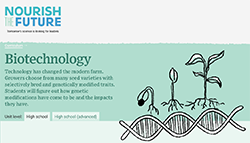 Relevancy and Engagement
ksagclassroom.org
Relevancy and Engagement
ksagclassroom.org

Modeling Selective Breeding with Starburst®
In this activity students will model the process of selective breeding using Starburst® candies to evaluate the strengths and weaknesses of this breeding technique.
Time to Complete
45 minutes
Materials
- Selective Breeding student worksheet, 1 copy per student
- Starburst® candies* in red, yellow and orange; 3 per student
- Opaque cups (foam cups or colored plastic that students cannot see through); 1 per every 2 students
- Selective Breeding slide deck
- Electronic device for researching information
- Teacher Guide for reference
*Each candy represents a trait or phenotype. This activity does not intend to model allele combinations. Starburst® candies were chosen for the activity because they have no allergens and are individually wrapped.
Procedures
- Give each student one copy of the Selective Breeding handout and 1 cup with 3 Starburst® candies.
- Instruct students to begin by reading page 1 of their handout. Explain that they will be learning more about corn and some of the genetic traits that improve the productiveness of the plant.
- Guide students to begin following the step-by-step instructions beginning on page 2 of the handout. If desired, you can use the Selective Breeding slide deck to help guide students through the activity.
- Once students have completed the activity, check for understanding. Refer to page 3 of the teacher key for clarification if needed. Review and summarize the following key concepts:
- Selective breeding is more effective than random crossing to obtain specific traits in offspring.
- Some traits are controlled by multiple genes.
Author
Nourish the Future
Organization
Nourish the Future
Sources
This activity is an excerpt of the High School Biotechnology Curriculum created by Nourish the Future. Find more high school activities on the Matrix.